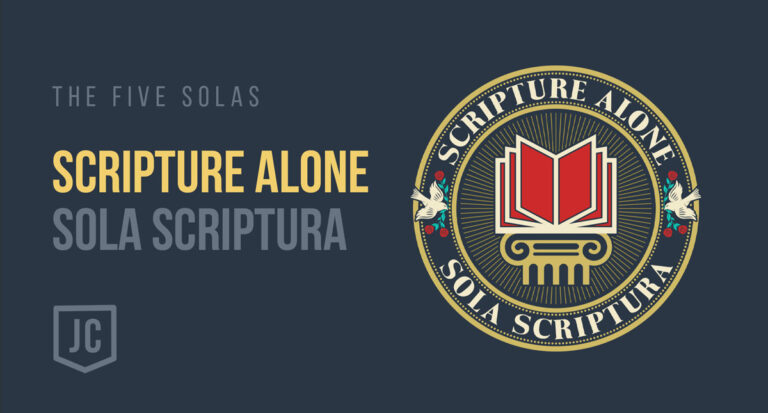The Five Solas of the Reformation: Soli Deo Gloria
In the final installment of our Solas series, we hit on one of the major themes of the Reformed faith: Soli Deo Gloria, Latin for “Glory to God Alone.” This one phrase encapsulates the principle underpinning the essence of faith – that every action, endeavor, and facet of existence is to be directed towards the worship and glory of God while rejecting the pursuit of self-glorification and pride.
At its core, Soli Deo Gloria shifts our focus from personal success to divine glory. It’s a call to reorient our motivations and inspirations, finding fulfillment not in the works and reputation of men but in the magnification of God’s majesty.

What Does Soli Deo Gloria Mean?
Throughout Scripture, we are taught that God and God alone can accomplish the salvation of sinners. Soli Deo Gloria acknowledges that God initiates, proceeds, and completes the work of saving wretched people like you and me.
Soli Deo Gloria means giving all the credit to God because His glory isn’t just something He owns; it’s who He is – His greatness and worth shining through in our salvation.
But why is the glory of God the ultimate goal of everything? Simple: He planned it that way. Since the beginning of time, His deliberate plan and purpose have been woven into the fabric of creation and history. God’s overarching intention is to reveal His glory in every act of creation, governance, and redemption.
In the Psalms we learn, “The heavens declare the glory of God” (Psalm 19:1), affirming that even the universe itself is designed to reflect His magnificence. Isaiah echoes this sentiment, proclaiming that all humanity, created in His image, exists ultimately for His glory as well (Isaiah 43:6–7). He made the universe reflect His glory and made us enjoy and honor Him.
This idea isn’t just for Sundays; it’s for every moment of our lives. Everything that happens – big or small – fits into His grand plan to reveal His glory. So, when we talk about Soli Deo Gloria, we say, “All the glory goes to God – now and forever!”
How Does Soli Deo Gloria Fit with the Other Five Solas of the Reformation?
As we said in our very first installment, salvation is a gift of grace (sola gratia), received through faith (sola fida) in Christ (solus Christus), as revealed in Scripture (sola scriptura) – all culminating in the glory of God alone (soli Deo Gloria).
Soli Deo Gloria, the conviction that all glory belongs to God alone, harmonizes seamlessly with the other five solas of the Reformation.
Think about this: if salvation is indeed a gift of grace (sola gratia), freely given by God without any merit on our part but through Christ (solus Christus), and if it is received through faith (sola fide), then it logically follows that the ultimate glory for our salvation rests solely with God because we did nothing. God came down to our level to raise us to Him.
The apostle Paul confirms this to us when he says, “he who glories, let him glory in the Lord” (2 Corinthians 10:17). Soli Deo Gloria refutes any notion of a joint venture in salvation where man shares in the glory. It stands against a man-centered view of salvation, where human effort is decisive.
The Reformers championed Soli Deo Gloria to emphasize that salvation is entirely God’s work. From its inception to its culmination, God orchestrates every aspect of salvation alone. Thus, all honor, praise, and glory rightly belong to Him and Him alone.
What Does Soli Deo Gloria Mean for Us Today?
The great musical geniuses of old, like Johann Sebastian Bach and George Frideric Handel, used to sign their work SDG – short for Soli Deo Gloria.
Their example serves as a potent reminder for us to dedicate every aspect of our lives – whether it’s our work, time with family, hobbies, or personal goals – to the ultimate glory of God rather than seeking our own recognition or praise.
But what does “glory” really mean? It’s more than just honor or admiration; it’s about acknowledging and exalting God’s greatness, beauty, and worth. It’s recognizing His divine attributes and magnificence and reflecting that back. God gives us life. He gives us breath. By praising and glorifying him, we give him back the breath he is owed.
Give God His Breath Back and Proclaim His Glory Today and Every Day of Your Life
Let us commit ourselves to living each day in a manner that brings glory to God – not seeking our fame or recognition, but rather to honor Him in all that we do. Let us proclaim His glory today and every day, recognizing His greatness and offering Him the praise and adoration He deserves.








